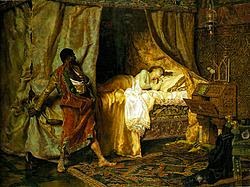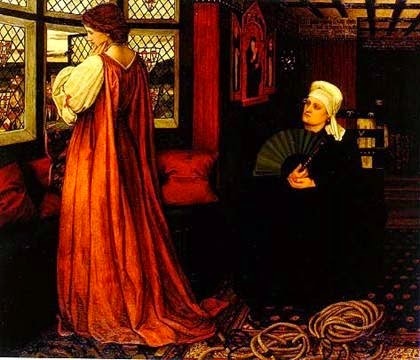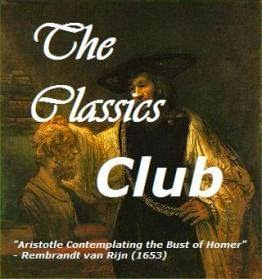Being swamped with reads and my two courses (one of which is taking three times as long as they estimated), I was going to wisely ignore the 50 question survey from the Classics Club. But when I read a few of my blogging friends interesting posts, I had to give it a whirl. It took 2 weeks to compile but worth every minute. I’d almost forgotten the habit of past contemplation, which brings such value into our present reading habits.
1. Share a link to your club list.
2. When did you join The Classics Club? How many titles have you read for the club?
I joined on November 12, 2013. My complete list is comprised of 168 books: 15 books from Ancient times; 16 books from Medieval/Early Renaissance; 41 books from Early Modern times; and 96 books from Modern times. Of the 168 books, I’ve finished 33, so I’m exactly on track (or ½ a book behind, if I want to be picky!).
3. What are you currently reading?
Le Morte d’Arthur by Sir Thomas Malory and Utopiaby Sir Thomas More. Two books by two “sirs” ….. boy, how did that happen?
4. What did you just finish reading and what did you think of it?
Four Shakespeare plays, Romeo & Juliet, Othello, A Midsummer Night’s Dream and Much Ado About Nothing. I’m reading them for an edX Shakespeare course. Both new to me were Romeo and Juliet and Othello and I really enjoyed them, especially Othello. The last two were re-reads: I love Much Ado but A Midsummer Night’s Dream has never really been a favourite.
5. What are you reading next? Why?
For Christmas, I’d like to read Dickens, The Chimes; for the spin, I’ll be reading Gulliver’s Travels by Jonathan Swift; God in the Dock for my C.S. Lewis Project; and I hope to get to Framley Parsonage by Anthony Trollope to continue the series, but I am doubting that will happen until January.
6. Best book you’ve read so far with the club, and why?
Absolutely, without even having to think about it, Paradise Lost by John Milton. It completely blew me away; his characterization of Satan was by far the best that I’ve ever encountered, and the scope of the work was so ambitious that one could only admire his ability, even if he fell short in certain areas. War and Peace by Leo Tolstoy, would probably come second. As I just mentioned on Ruth’s blog, after I finished this one book, I felt I’d had the benefit of reading three!
7. Book you most anticipate (or, anticipated) on your club list?
Oh, the anticipation changes depending on my mood. Right now, I’m looking most forward to Ivanhoe by Sir Walter Scott and The Histories by Herodotus.
8. Book on your club list you’ve been avoiding, if any? Why?
My dread of certain books, however, does not often change. I would go to the furthest Antipodes to avoid The Communist Manifesto by Karl Marx and Friedrich Engels and Aristotle’s Ethics. I would have also paid to avoid anything by Henry James, James Joyce, Ernest Hemingway, etc. I have few of these writers on my CC list, which was really dumb because now they’ll all be populating my second list.
9. First classic you ever read?
I believe it was Pride and Prejudice by Jane Austen. Either that or The Vicar of Wakefield by Oliver Goldsmith. I was late starting to read classics and, honestly, read mostly garbage before I hit 20.
10. Toughest classic you ever read?
Well, because I was a classics newbie, I’d have to say The Vicar of Wakefield but only because my brain had to be trained to absorb well-written prose. Thankfully I was a fast-learner. But after I was “classicfied”, I would probably choose The Divine Comedy. On the surface, it’s not a tough read but if you want to dig deeper, there are so many layers to it that I don’t think you could mine them all if you read it once per year.
11. Classic that inspired you? or scared you? made you cry? made you angry?
The Chosen by Chaim Potok. The relationship between one of the characters and his father was so well-drawn out, yet vibrating with conflict and tension. I don’t want to give too much away, but for most of the book, you’re shocked at how one character treats the other, then at the end you find out why he has been acting in that manner, and it’s a good reason. Then you experience the internal conflict within yourself …… his behaviour is wrong yet it’s not wrong. You want to condemn him yet, how, when his motivations were pure? It’s really quite a fantastic book.
12. Longest classic you’ve read? Longest classic left on your club list?
Definitely, The Count of Monte Cristo followed by War and Peace. And the longest left on my list ……???? Wow, thanks for this question ….. it’s made me realize the number of true chunksters I have yet to read. And it’s scary! Probably The Decline and Fall of the Roman Empire (did I really put this on my list?) and then possibly, The Fairie Queene.
13. Oldest classic you’ve read? Oldest classic left on your club list?
That would be The Epic of Gilgamesh, which I think dates to around 2000 B.C., and the oldest one left is Herodotus’ Histories.
14. Favorite biography about a classic author you’ve read — or, the biography on a classic author you most want to read, if any?
I’ve read a great number of biographies this year and I’m not sure that I could pick a favourite. Thomas Merton’s Seven Storey Mountain was wonderful, as was Surprised by Joy by C.S. Lewis. And I can’t miss mentioning Augustine’s Confessions, as well as saying that I began a new relationship with Montaigne after reading selected portions of his Essays!
15. Which classic do you think EVERYONE should read? Why?
Oh, I don’t think I can answer this one. I need to give recommendations based on the person or it could go horribly wrong.
16. Favorite edition of a classic you own, if any?
I have a first edition of The Pickwick Papers by Charles Dickens, which has four engravings missing. Every time I look at it, it gives me a thrill.
17. Favorite movie adaption of a classic?
Pride and Prejudice from 1995 with Colin Firth and Jennifer Ehle; Cold Comfort Farm with Kate Beckinsale; and Kenneth Branaugh’s Mucho Ado About Nothing.
18. Classic which hasn’t been adapted yet (that you know of) which you very much wish would be adapted to film.
Dante’s The Divine Comedy, or a good adaptation of Le Morte d’Arthur, both likely impossibliites.
19. Least favorite classic? Why?
Rebecca by Daphne du Maurier. Should I start ducking the tomatoes? It was painful! The characters didn’t resemble real people and their actions were stupefyingly dense. I’m still trying to brace myself to read some more of her works.
20. Name five authors you haven’t read yet whom you cannot wait to read.
1. Albert Camus
2. Winston Churchill
3. Herodotus
4. Honoré Balzac
5. Samuel Johnson
21. Which title by one of the five you’ve listed above most excites you and why?
I don’t know but grasping at a first thought, I’ll say, A Journey to the Western Islands of Scotland by Samuel Johnson.
22. Have you read a classic you disliked on first read that you tried again and respected, appreciated, or even ended up loving? (This could be with the club or before it.)
I can’t think of any that specifically fit this criteria, but I did hate A Picture of Dorian Gray for about ¾ of the book and then ended up loving it. I also thought I’d hate The Dharma Bums by Jack Kerouac but was charmed by it. Perhaps I’m really a closet-hippie, perish the thought!
23. Which classic character can’t you get out of your head?
Monsieur Myriel from Les Miserables, Satan from Paradise Lost, Sarpedon from The Iliad (don’t ask me why), Moomintroll and Socrates. Whew! What a list!.
24. Which classic character most reminds you of yourself?
Definitely Elizabeth Bennet!!
25. Which classic character do you most wish you could be like?
Cassandra from I Capture the Castle but probably for only certain parts of her life, Gerald Durrell for the part of his life that he was on Corfu as a child, and Elizabeth Bennett.
26. Which classic character reminds you of your best friend?
Believe it or not, Jane Bennett.
27. If a sudden announcement was made that 500 more pages had been discovered after the original “THE END” on a classic title you read and loved, which title would you most want to keep reading? Or, would you avoid the augmented manuscript in favor of the original? Why?
Pride and Prejudice and Jane Eyre (I think O mentioned these books too) In these books it always seems like the fun ends after marriage, and it would be groundbreaking to discover that it doesn’t!
28. Favorite children’s classic?
Swallows and Amazons by Arthur Ransome and Finn Family Moomintroll by Tove Jansson.
29. Who recommended your first classic?
I chose it myself.
30. Whose advice do you always take when it comes to literature. (Recommends the right editions, suggests great titles, etc.)
My blogger friends, particularly O who finds absolute treasures, Jean, who I think knows about every book that was ever printed, and Ruth who picks truly wonderful reads. I also go to Nancy for history books and other eclectic finds, and Sophia for YA fiction; they don’t always fit into the classics category but I’m mentioning them in any case.
31. Favorite memory with a classic?
Reading Middlemarch by George Eliot for the first time. I read it in the summer on the beach and was completely enthralled for the 6 days it took me to read it. I can still remember the crash of the waves.
32. Classic author you’ve read the most works by?
Definitely C.S. Lewis. I could probably teach a course on him now. I probably know more about him than he knew about himself. Wait, no, Jean knows more than I do.
33. Classic author who has the most works on your club list?
William Shakespeare. There is really no excuse as to why I haven’t read all of his plays.
34. Classic author you own the most books by?
C.S. Lewis again. Although I do own a lot of Enid Blyton. Would she count as a classic? And Dickens ….. lots of Dickens. Oh, and I have about 10 different copies of The Lord of the Rings.
35. Classic title(s) that didn’t make it to your club list that you wish you’d included? (Or, since many people edit their lists as they go, which titles have you added since initially posting your club list?)
Not really any I can think of. I’m happy with my list and I know I’ll be making another. Now if you’d asked me which books I’d remove from the list, I’d have a detailed answer!
36. If you could explore one author’s literary career from first publication to last — meaning you have never read this author and want to explore him or her by reading what s/he wrote in order of publication — who would you explore? Obviously this should be an author you haven’t yet read, since you can’t do this experiment on an author you’re already familiar with. 🙂 Or, which author’s work you are familiar with might it have been fun to approach this way?
Hmmm, this is difficult to answer. Perhaps Balzac? But that would be an enormous undertaking. I’m reading through Zola’s Rougon-Macquart series right now (on book four) but since I’ve read him, he wouldn’t count.
37. How many rereads are on your club list? If none, why? If some, which are you most looking forward to, or did you most enjoy?
I had 11 re-reads. I was probably looking forward to The Odyssey the most of all and I did get tons more out of it on the second reading.
38. Has there been a classic title you simply could not finish?
The Name of the Rose by Umberto Eco. I felt that he had some ulterior motive or that I was being dragged on a journey by someone I didn’t trust. Sounds odd, I know. It’s on my list so I’m going to give it another try. Oh, wait, I should have said Tender is the Night by F. Scott Fitzgerald. Whenever I read Fitzgerald’s works I feel like I’ve wasted my time and I don’t think I’ve ever felt like this before with a classic.
39. Has there been a classic title you expected to dislike and ended up loving?
Definitely! To The Lighthouse by Virginia Woolf. I loved her stream of consciousness in this book.
40. Seven things you’re looking forward to next year in classic literature?
1. Start to read poetry regularly.
2. Reading more essays. I so enjoyed Montaigne this
year!
3. Reading The Cantebury Tales paired with The Brubury
Tales, a modern re-telling.
4. Continuing my WEM & Shakespeare challenges.
5. Concentrating on regularly reading some children’s
classics for my much neglected children’s book blog,
6. Reading more regularly in French (we’ll see how that
goes)
Challenge, I think. For those of you who don’t know
me, lists make me nervous, but this challenge seems
open enough that I hope to make it work.
41. Classic you are definitely going to make happen next year?
The Cantebury Tales, and The Histories, and possibly adding Ivanhoeand The Fairie Queene as good intentions.
42. Classic you are not going to make happen next year?
I am dreading Gibbon’s The Decline and Fall of the Roman Empire. Good grief, why did I put it on my list? I mean I want to read it, but when it’s on a list you have to. I also wish to avoid The Interpretation of Dreams by Sigmund Freud and Thus Spoke Zarathustra by Friedrich Nietzsche.
43. Favorite thing about being a member of the Classics Club?
Being part of a blogging community has been the best thing. I’ve made so many new blog friends and it’s been wonderful to be able to share a passion for reading with everyone and be introduced to new books.
44. List five six fellow clubbers whose blogs you frequent. What makes you love their blogs?
Yipes! It’s so hard to pick just five, or even six!
1. O’s blog Behold the Stars – she finds such obscure classics from well-known authors (I don’t know how she does it) and her reviews are so well-researched, amazingly well-written and chock-full of interesting tidbits.
2. Ruth @ A Great Book Study – I just love how thoughtful her reviews are; she gives insights into the deep profound mysteries of life, probably without knowing that she does it!
3. Jean @ Howling Frog Books – I have never met a blogger who has introduced me to more of an eclectic assortment of excellent books. It’s great! And she’s smarter than me! 😉
4. Jason @ Literatue Frenzy – he’s not always active (on his blog, I mean) but always deeply intuitive. His posts are wonderfully eloquent, passionate and insightful, and he is perhaps the most polite blogger I know!
5. Nancy @ Ipsofactdotme – a truly contemplative reader and one with great perseverance (with much struggle, she taught herself to read in French). Her reviews are insightful and structured in a way that make them refreshing reads. She’s always very gracious.
6. Carol @ Carol’s Notes – by reading just one of her posts, you can tell that she is so obviously a writer. She blogs not only about books, but about human experience and human nature, with a wisdom that is truly amazing. It takes me about four days to think about her posts before I’m able to respond.
Perhaps if I stop with numbers, I can get a couple more in:
Honourable mention: Marianne’s blog — I know she likes to keep it low key but I can’t rave enough about her writing. It’s just beautiful. Every post, every comment is a delight to read and leaves you feeling like you’ve just received a unique and refreshing warm spring breeze.
And lastly, all the blogs on my blogroll to the left. They are all excellent.
45. Favorite post you’ve read by a fellow clubber?
46. If you’ve ever participated in a readalong on a classic, tell about the experience? If you’ve participated in more than one, what’s the very best experience? the best title you’ve completed? a fond memory? a good friend made?
Oh my, yes!! In spite of feeling that I’ve had a rather average reading year, I participated in two read-alongs that were just amazing: the Paradise Lost Read-Along and The Odyssey Read-Along. They both happened at times when I had time to read and I learned sooooo much from having the time to read contemplatively. I hope I can get free time that will coincide with another read-along in 2015.
47. If you could appeal for a readalong with others for any classic title, which title would you name? Why?
I’m not sure. Perhaps Les Miserables by Victor Hugo, which is not even on my list and would be a re-read for me, but I think it would be a lot of fun! I’d also like to do a read-along on a non-fiction book because I think it would be weird, but I have no idea which one.
48. How long have you been reading classic literature?
Not very long. I probably began in my early 20s, but seriously since 2010.
49. Share up to five posts you’ve written that tell a bit about your reading story. Reviews, journal entries, posts on novels you loved or didn’t love, lists, etc.








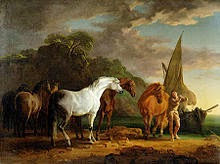






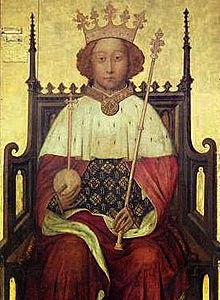


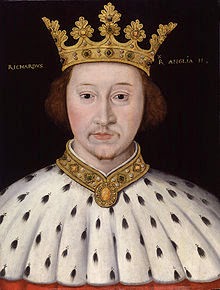.jpg)


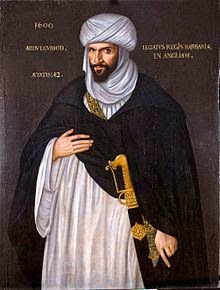
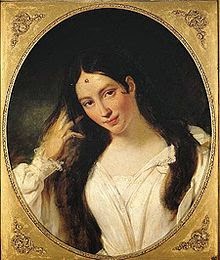_par_F._Bouchot.jpg)
